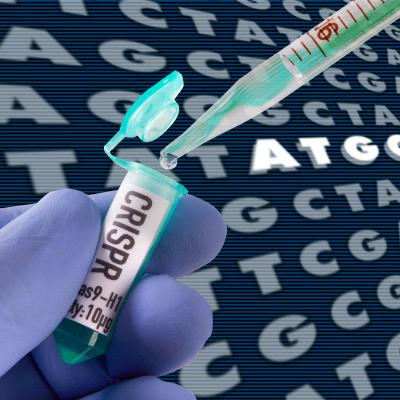Anúncios
CRISPR technology has been transforming modern medicine with its precision in genetic editing. Its application in personalized treatments allows for highly targeted interventions. This innovation expands therapeutic possibilities and improves clinical effectiveness.
Through CRISPR, it is possible to modify genes based on the specific needs of each patient. This marks a remarkable advancement in the pursuit of tailored medical solutions. With ongoing research, the impacts of this technology are still being explored.
Anúncios

Understanding How CRISPR Gene Editing Tools Work in Personalized Treatments
CRISPR gene editing technology has revolutionized the field of genetics and personalized medicine. At its core, CRISPR (Clustered Regularly Interspaced Short Palindromic Repeats) allows scientists to precisely modify DNA sequences in living organisms. This technology uses a guide RNA to direct the Cas9 enzyme to specific locations in the genome, where it can cut the DNA. After the cut, the cell’s natural repair mechanisms come into play, allowing for the insertion or deletion of genetic material. This capability opens up a multitude of possibilities for customizing treatments based on patients’ unique genetic compositions.
The potential applications of CRISPR in personalized treatments are vast. It can be used to correct genetic mutations that cause diseases, enhance the effectiveness of immunotherapies, and even create genetically modified organisms for research and therapeutic purposes. By understanding the genetic basis of diseases, CRISPR enables the development of targeted therapies that can address root causes, rather than just symptoms. This shift from a one-size-fits-all approach to a more customized strategy represents a significant advancement in treating various genetic disorders, cancers, and other conditions.
Revolutionary Potential of CRISPR in Personalized Medicine
CRISPR technology offers a direct approach to altering DNA with specificity. As a result, it becomes possible to treat genetic diseases at their source, not just alleviate symptoms. This potential places CRISPR at the heart of precision medicine.
In patients with known mutations, genetic editing can correct hereditary errors. This represents real hope for diseases once considered incurable. The possibility of preventing the manifestation of certain conditions is also under study.
Beyond rare diseases, CRISPR can be useful in fighting cancer. By modifying immune cells, they can be directed more efficiently to tumors. This personalization of the immune response increases therapeutic effectiveness.
The continuous advancement of biotechnology has broadened CRISPR’s clinical applications. As trials evolve, new treatment options emerge. This allows doctors to offer safer and more effective solutions to their patients.
Genetic Precision: CRISPR’s Decisive Advantage

One of CRISPR’s greatest advantages is its precision in editing DNA. This significantly reduces the risks of undesirable side effects. This accuracy is crucial when it comes to genetic interventions in humans.
The guide RNA used in the process ensures that the Cas9 enzyme acts at specific locations. Thus, the risk of off-target changes is minimized. This makes procedures safer and more predictable for patients.
This precision contributes to confidence in adopting CRISPR in clinical protocols. Personalized therapies require careful and well-planned interventions. CRISPR provides the necessary tools to achieve this level of sophistication.
As detection and monitoring methods evolve, CRISPR’s effectiveness increases. This further strengthens its role in personalized medicine. The technology continues to be refined to ensure increasingly reliable results.
Advantages of CRISPR Gene Editing Tools in Personalized Treatments
One of the main advantages of CRISPR gene editing tools is their precision. Unlike previous gene editing methods, which often resulted in unwanted mutations in other parts of the genome, CRISPR allows for highly accurate targeted modifications. This precision is crucial in personalized medicine, where the goal is to tailor treatments to an individual’s specific genetic profile. By minimizing off-target effects, CRISPR increases the safety and effectiveness of therapies, making it the preferred choice for researchers and clinicians.
Another significant advantage is the speed and efficiency with which CRISPR can be employed. Traditional gene editing techniques often require lengthy and complex procedures, while CRISPR can be designed and implemented relatively quickly. This fast response time is especially important in the context of personalized treatments, where timely interventions can significantly improve patient outcomes. As researchers continue to refine CRISPR technology, the potential for faster and more effective treatments becomes increasingly achievable.
Moreover, CRISPR’s versatility enhances its advantages in personalized medicine. It can be applied to a wide range of diseases, from genetic disorders to cancers and infectious diseases. This adaptability means CRISPR can play a crucial role in developing therapies for conditions that were once considered untreatable. As our understanding of genetics and disease mechanisms deepens, the ability to harness CRISPR for a diverse array of applications will undoubtedly lead to more innovative and effective treatment options.
Finally, CRISPR technology’s cost-effectiveness cannot be overlooked. As demand for personalized medicine grows, the need for affordable and cost-efficient treatment options becomes paramount. CRISPR’s relatively low cost compared to traditional gene editing methods allows for broader implementation in clinical settings. This accessibility opens doors for more patients to benefit from personalized treatments, improving public health outcomes and advancing the field of medicine as a whole.
How CRISPR Gene Editing Tools Enhance Personalized Treatments

CRISPR gene editing tools enhance personalized treatments in several impactful ways. First, they allow for targeted genetic modification for specific diseases, enabling researchers to address the underlying genetic causes of various conditions. By identifying the specific mutations responsible for a patient’s disease, CRISPR can be employed to correct these mutations at the DNA level, potentially reversing the disease process. This targeted approach not only improves the effectiveness of treatments but also reduces the likelihood of adverse side effects associated with less precise therapies.
Additionally, advancements in personalized medicine using CRISPR have led to the development of treatment protocols based on individual genetic profiles. This means that therapies can be customized to suit each patient’s unique genetic makeup, resulting in more effective and individualized care. For example, cancer patients can benefit from CRISPR-based therapies designed to target specific mutations present in their tumors, increasing the chances of successful treatment outcomes.
Applications of the CRISPR-Cas9 system in treating genetic diseases represent another significant enhancement in personalized medicine. Using the CRISPR-Cas9 system, researchers can create genetic disease models that mimic conditions in human patients. These models are invaluable for studying disease mechanisms and testing potential therapies. Moreover, the ability to edit genes in patient-derived cells enables the development of personalized treatments informed by the individual’s specific genetic context, paving the way for more effective interventions.
Precision medicine solutions through genome editing are becoming increasingly viable thanks to CRISPR technology. By integrating genomic information with clinical data, healthcare providers can develop comprehensive treatment plans that consider not only the genetic aspects of a patient’s condition but also their lifestyle, environment, and overall health. This holistic approach to personalized medicine has the potential to transform patient care, leading to better outcomes and quality of life.
Furthermore, ethical considerations in gene editing technologies are an essential aspect of integrating CRISPR into personalized treatments. As the technology advances, discussions on the ethical implications of gene editing continue to evolve. Ensuring CRISPR is used responsibly and for the benefit of patients is crucial. Ongoing dialogue among scientists, ethicists, and policymakers is vital to navigate the complexities of gene editing and ensure its applications align with societal values and ethical standards.
Finally, innovations in biotechnology are driving personalized therapies, with CRISPR at the forefront of these advancements. As researchers explore new ways to utilize CRISPR and enhance its capabilities, the potential for groundbreaking therapies continues to expand. Innovations in delivery methods, safety measures, and efficiency improvements are contributing to the growing landscape of personalized medicine, making CRISPR an indispensable tool in the quest for tailored treatments.
Interested in Learning More About CRISPR Gene Editing Tools in Personalized Treatments?
- Targeted genetic modification for specific diseases enables precise corrections of genetic mutations.
- Advancements in personalized medicine using CRISPR lead to individualized treatment protocols based on genetic profiles.
- Applications of CRISPR-Cas9 in treating genetic diseases enable patient-specific models for therapy testing.
- Precision medicine solutions through genome editing integrate genomic and clinical data for comprehensive treatment planning.
- Ethical considerations in gene editing technologies ensure responsible CRISPR use for patient benefit.
- Biotech innovations continue to drive personalized therapies, enhancing CRISPR’s capabilities and applications.
In conclusion, integrating CRISPR gene editing tools into personalized treatments represents a significant advancement in medical science. By enabling precise genome modifications, CRISPR offers the potential to address the root causes of diseases and customize therapies for individual patients. As research continues to evolve, CRISPR’s impact on personalized medicine is likely to become even more profound, opening new avenues for treatment and improving patient outcomes.
Frequently Asked Questions
What are CRISPR gene editing tools?
CRISPR gene editing tools are technologies that allow the alteration of an organism’s DNA. They help correct diseases and genetic traits.
How can CRISPR be used in personalized treatments?
CRISPR can adjust genes according to your needs. This helps create treatments that work better for you, avoiding those that don’t.
What are the benefits of CRISPR tools in treatments?
Benefits include precision, speed, and the ability to treat specific diseases. You can receive a unique and effective treatment.
Are there risks associated with using CRISPR?
Yes, there are risks. DNA changes can have unexpected effects. It’s important to talk to a doctor about these risks before using it.
How can I know if I’m a good candidate for CRISPR treatments?
A specialized doctor can evaluate your case. They will consider your condition
